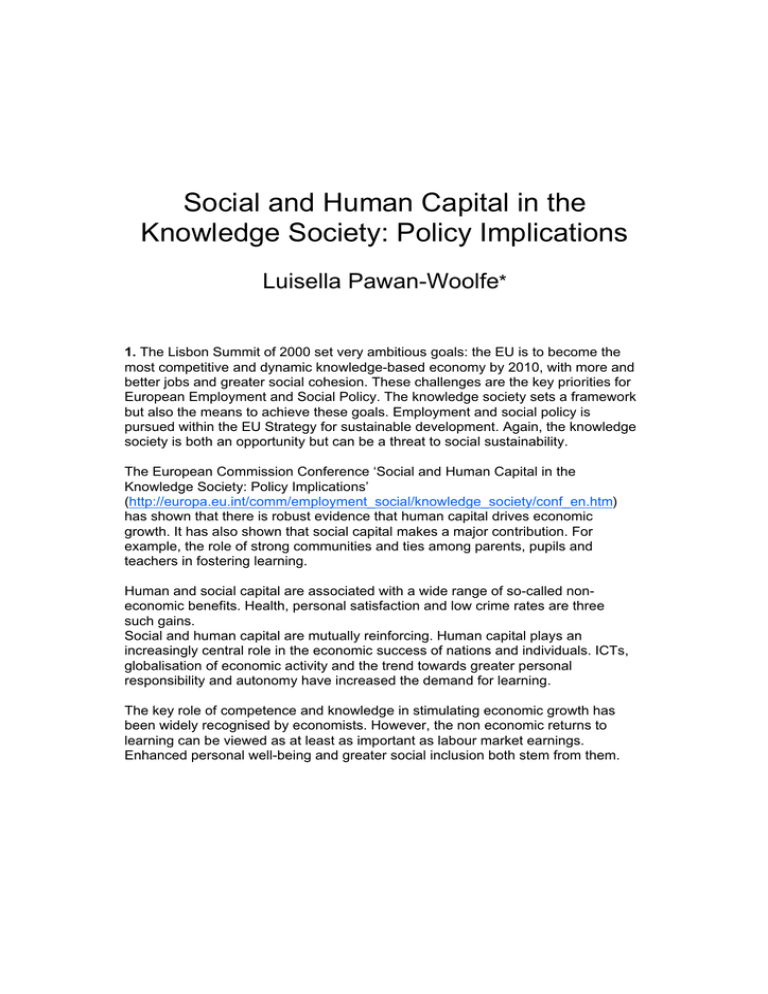Social and Human Capital in the Knowledge Society
advertisement

Social and Human Capital in the Knowledge Society: Policy Implications Luisella Pawan-Woolfe* 1. The Lisbon Summit of 2000 set very ambitious goals: the EU is to become the most competitive and dynamic knowledge-based economy by 2010, with more and better jobs and greater social cohesion. These challenges are the key priorities for European Employment and Social Policy. The knowledge society sets a framework but also the means to achieve these goals. Employment and social policy is pursued within the EU Strategy for sustainable development. Again, the knowledge society is both an opportunity but can be a threat to social sustainability. The European Commission Conference ‘Social and Human Capital in the Knowledge Society: Policy Implications’ (http://europa.eu.int/comm/employment_social/knowledge_society/conf_en.htm) has shown that there is robust evidence that human capital drives economic growth. It has also shown that social capital makes a major contribution. For example, the role of strong communities and ties among parents, pupils and teachers in fostering learning. Human and social capital are associated with a wide range of so-called noneconomic benefits. Health, personal satisfaction and low crime rates are three such gains. Social and human capital are mutually reinforcing. Human capital plays an increasingly central role in the economic success of nations and individuals. ICTs, globalisation of economic activity and the trend towards greater personal responsibility and autonomy have increased the demand for learning. The key role of competence and knowledge in stimulating economic growth has been widely recognised by economists. However, the non economic returns to learning can be viewed as at least as important as labour market earnings. Enhanced personal well-being and greater social inclusion both stem from them. 226 The European Information Society Social networks and learning organisations stimulate informal learning on the job and indeed in everyday life. Social and human capital enable individuals, communities and firms to cope with the demands of rapid change. 2. In the knowledge society new technologies are major drivers of economic and social change. Such change is pervasive and diversified. The current socioeconomic transformation is based on the massively increased ability of people to obtain and process information. Knowledge creation and utilisation have been radically altered. The social and human capital perspective permits us to focus on individuals and social relations. Such an analysis provides new insights into the nature of this knowledge revolution. One key question: are the changes brought about by the knowledge society sustainable? More precisely, is human and social capital increased or diminished? We live more and more in a networked society. Is this society inclusive or exclusive? Is the digital divide inevitable? Will it grow? What should we do to reduce it? ICTs allow people to participate in society, but may also exclude some. The impact of ICTs on civil society, participatory democracy and citizenship is of immense concern. Universal access/service does not guarantee equal participation, especially if it is not coupled with digital literacy for all. 3. Employment and social policymakers will certainly need to address how entrepreneurship and innovation will be strengthened by the knowledge society. Intellectual capital must be enhanced as a key complement of human capital. But the knowledge society risks being the non-stop work society. Sustainability within the knowledge society is a paramount policy objective. Human and social capital building bring to the fore economic, environmental, social as well as cognitive and psychological challenges. Social sustainability requires a quality of life and social cohesion. The knowledge society depends on sharing and transferring knowledge. Policymakers have often sought to bring about e-inclusion and other aspects with a top-down approach. We should in the future concentrate on encouraging a bottom-up set of initiatives. The local level is particularly important in furthering full participation in the knowledge society. If we compare the experience of the knowledge society between soon-to-be new Members and the old Member States in the European Union, we observe very wide divergences within and between the candidate countries, as Social and Human Capital in the Knowledge Society 227 indeed there are within the existing EU. An enlarged EU will have wider differences. But existing Member States and candidate countries can each learn from each other. Both have had successful specific initiatives raising human and social capital. The candidate countries will have to think and plan very carefully how they are to be best placed in the knowledge society within an enlarged EU. They will have to decide how to use national and Community programmes and funds to maximise social and human capital building. They must choose to what extent the Structural Funds they receive can and should concentrate on the more immaterial investments that underpin the knowledge society. Roads and bridges are of course important. Furthermore, they appear relatively quickly and cannot be missed by local electors. But the long-term health and dynamism of the knowledge-based economy depends on a well-qualified, highly skilled workforce, able to adapt to new technologies and methods of working. 4. I wish to stress the importance of having a national knowledge society strategy. A strong and appropriate educational base and above all the institutions for lifelong learning are a must. Low-cost access to broadband telecommunications is equally vital in candidate countries for a knowledge society for all. At the risk of being repetitive, employment and social policy must pay close attention to social and human capital building. In the knowledge society this is particularly vital for more and better jobs and social inclusion. But what exactly is the role of the Commission and indeed of other stakeholders in ensuring that we reach the Lisbon targets? The Structural Funds at this very moment are the subject of an in-depth review. The future orientation of the European Social Fund, as well as the other Funds, must take account of the mutually reinforcing nature of social and human capital. The European Employment Strategy must also do this to maximise the number and quality of jobs. Member States, both the current but also the future ones, will be intimately involved in the reformulation of these two related policy areas. Member States also choose the projects for funding by the Structural Funds; they must choose those which best fit the knowledge society. The European Social Inclusion Strategy, modeled to some extent on the Employment Strategy, is still in its first phases. Nevertheless, it too will evolve to take account of the developments within the knowledge society. The digital divide, especially as it is not primarily a technology issue, will be a key focus. Social capital building will be a particular challenge in the future. Policymakers need to monitor constantly the social evolution of the knowledge 228 The European Information Society society. They also have a role in promoting awareness raising activities. 5. The Social Partners are important. The recent framework agreement on telework is a concrete step increasing human and social capital to the benefit of firms and workers. The social partners are themselves a key element of social capital. They increase the amount and the quality of knowledge transmitted to their members and to society as a whole. Unions will continue to adapt to new forms of work organisation and thus ensure strong representation of the workers. Worker can thus play an active role in the process of change. They can share in the ownership of -- and thus equally benefit from -- new ways of working. Employers have a direct interest in raising the capital of their workforce. They also have an interest in high levels of economic and social well-being in society as a whole. A skilled and motivated workforce needs good schooling. Public authorities finance and direct nearly all education in Member States. They will continue to be encouraged to aim for the highest levels of attainment in schools and universities. Public-private partnerships of all sorts are vital for effective lifelong learning in the knowledge society. The public authorities have an even greater responsibility to promote social capital building, in all its forms. Promoting ‘bonding’ social capital, for example, within families. Fostering ‘bridging’ social capital, for example, among business associates. Supporting ‘linking’ social capital, for example, across different social classes. Social inclusion policies currently aim at all three and should continue to do so. Gender is a source of social capital. Men and women have different networks. But, unequal access to employment or other aspects of society reduce the stock of social capital. Policies to promote gender and age equality raise social capital. The Commission and the Member States, and indeed the Social Partners, should continue to pursue them. Local communities spur social innovation and economic development; however, this is not automatic. For local communities to make the most of their own resources, integrated local development needs to be pursued. Local authorities, enterprises and civil society all have a role to play here. Social and Human Capital in the Knowledge Society 229 Individuals also have a role. Every person already makes some investment in their own intellectual capital. In the knowledge society individuals must make more and better investments in their own capabilities. Lifelong learning necessitates continuous, high-quality self-education. This is not the case just for the intellectual elite. Lifelong learning -- and thus individual investment -- is necessary for all people. Blue-collar workers, managers, parents, senior citizens, we all need to be lifelong learners. 6. Which areas require further analysis, exploration and research? Social capital and its relationship with economic, social inclusion and employment policies. As we heard, participation is everything. Measurements must also be pursued. Assessment and evaluation are equally important. Social capital is especially hard to quantify. More work needs doing on what to measure and how to measure it. Policymakers need to know if their policies are improving society. Commonly agreed indicators are essential. Benchmarking of strategies will help policymakers optimise social and human capital enhancement. What will the future bring? The Commission has already close co-operation with the OECD and ILO in the areas of social and employment policies. Social and human capital questions are clearly worthy of intensified joint work in the future And last – but by no means least – the links between policymakers and experts need to be developed further. New avenues of co-operation need to be explored in order to build on the social capital that this conference has created. Note * This is an edited version of the speech Mrs Pawan-Woolfe held at the end of the European Commission Conference on ‘Social and Human Capital in the Knowledge Society: Policy Implications’, Brussels, October 28-29, 2002. I am grateful to Mr Robert Strauss – Head of the Knowledge Society Unit – and to Mrs Lidia Pola for their contribution to the preparation of this text. 230 The European Information Society Reference European Commission Conference ‘Social and Human Capital in the Knowledge Society: Policy Implications’ – Proceedings online http://europa.eu.int/comm/employment_social/knowledge_society/conf_en.htm
